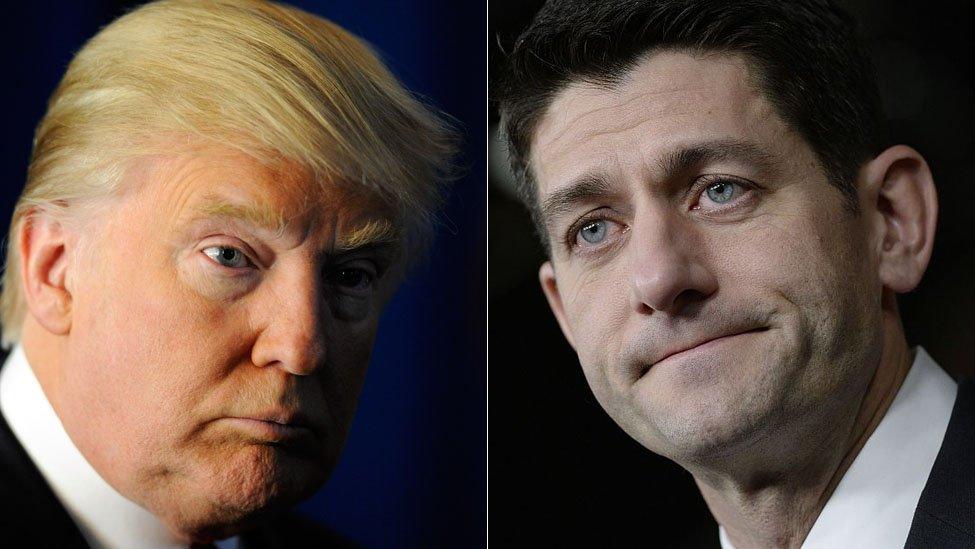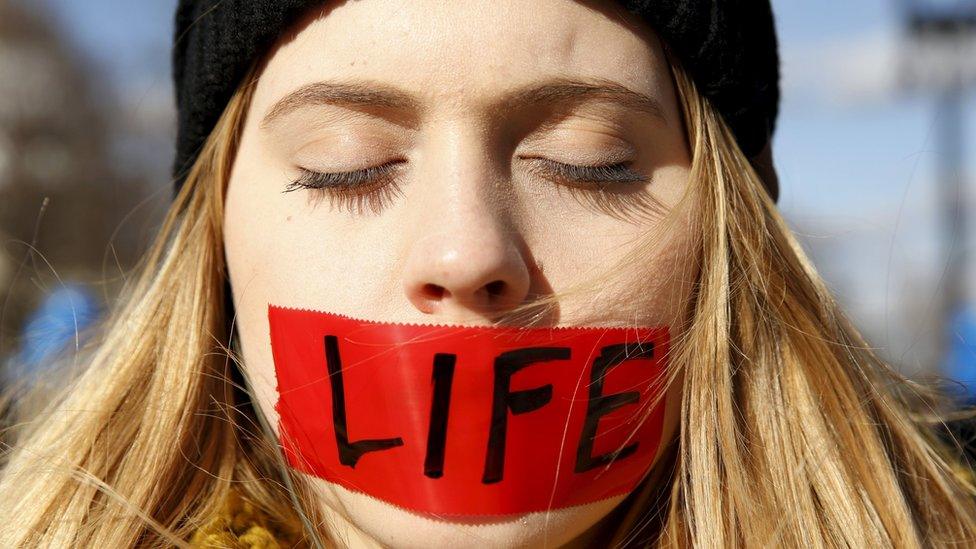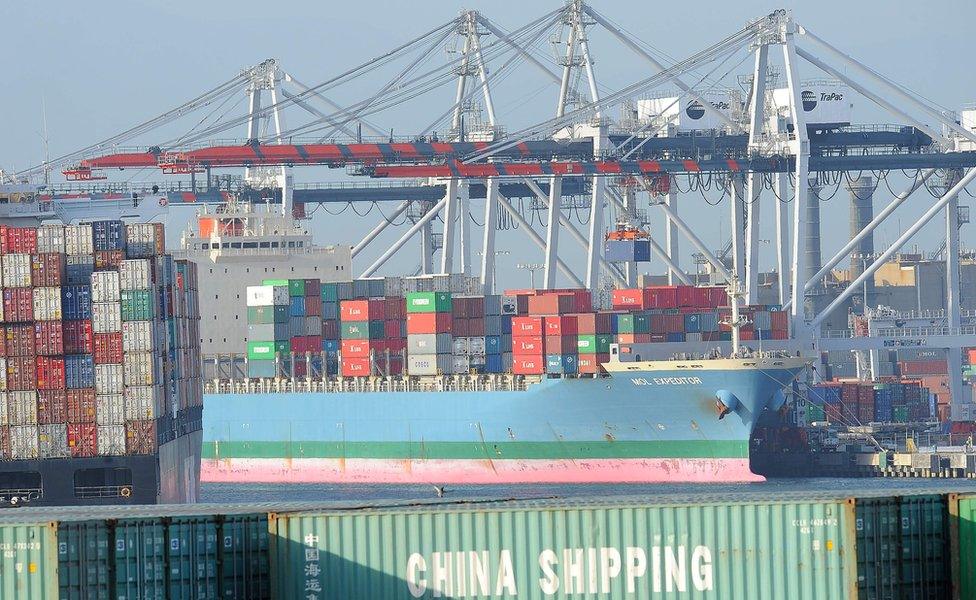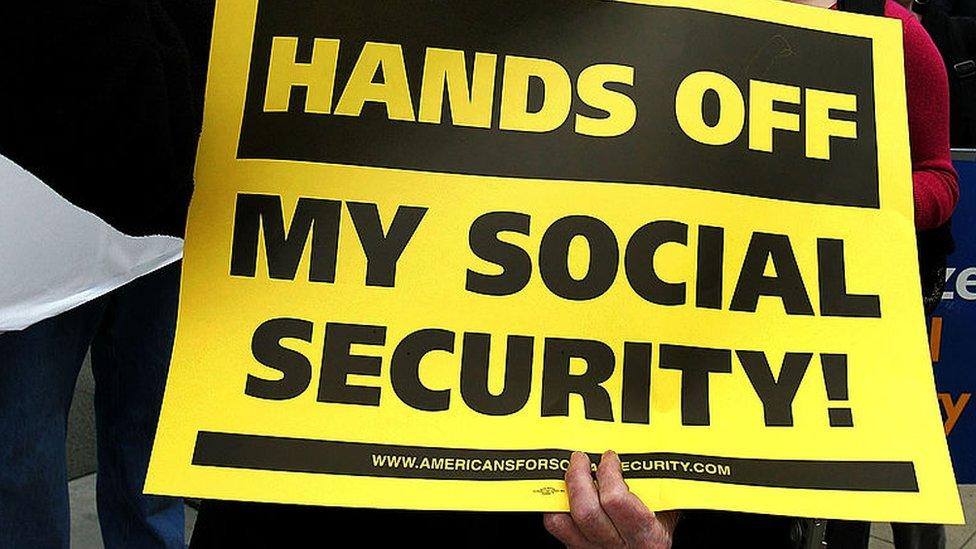Five issues where Trump and Ryan clash
- Published

House Speaker Paul Ryan (right) had said he was not ready to support Donald Trump's bid for presidency
Donald Trump's election as president came despite clashes with the traditional leadership of the Republican party, conflict that has not gone away since he moved to the White House.
Mr Trump has described himself as a "commonsense conservative" and he has millions of Republican votes to back his policies.
Here are five key issues upon which Mr Trump diverges from Republican orthodoxy.

Immigration

Mainstream Republicans: Traditionally Republicans have favoured increased immigration, in keeping with the party's close relationship with the business community. Both President Ronald Reagan and President George HW Bush extended amnesty to millions of undocumented workers while in office. Mainstream Republican figures such as Florida Senator Marco Rubio initially favoured similar immigration reforms that would have provided a "path to citizenship", but those efforts stopped after meeting resistance from more conservative members of Congress.
Trump: Views on immigration have shifted rightward across the Republican Party in recent years, but Mr Trump's views are some of the most extreme in American politics. He has:
advocated deporting nearly 11 million undocumented workers
called for a border wall to be built between the US and Mexico
said he would force Mexico to pay for the wall by threatening to ban Mexicans in the US from sending remittances home
Most Republicans oppose mass deportations. While they support increased border security, they do not advocate a border wall paid for by the Mexican government.

Abortion

Mainstream Republicans: Almost all Republicans oppose abortion. In recent years, Republican-controlled state legislatures have supported a wave of regulations that have limited access to abortions - new laws that have been met with legal challenges. The Supreme Court will likely decide the fate of these regulations, making the vacancy on the high court a critical issue for social conservatives. Social conservatives have also aggressively targeted Planned Parenthood. Although the group is one of the leading abortion providers in the US, the health care organisation also provides cancer screenings, contraception and screening and treatment for sexual transmitted diseases. It receives federal reimbursements for those services through the Medicaid programme. It also receives family planning health care grants, though regulations prohibit federal funds for abortions. Conservatives have sought to cut off its federal funding to weaken the organisation.
Trump: While Mr Trump's stance is comparable to many Republicans, his consistency is the issue. In the course of a week in early 2016, Mr Trump changed his position on abortion at least five times, alarming many social conservatives. This flexibility led to fears among many social conservatives that Mr Trump could not be trusted to appoint a Supreme Court justice who would oppose abortion rights. In the end, he nominated Neil Gorsuch, whose stance on abortion is far from clear. He has also publically praised the work of Planned Parenthood, saying their non-abortion services should receive federal funding. The organisation has done "very good work for millions of women," Mr Trump said.

International trade

Mainstream Republicans: Republicans have long supported trade agreements such as the North American Free Trade Agreement (Nafta), which increased trade between Canada, the US and Mexico. Many Republicans in the Congress supported the Trans-Pacific Partnership (TPP), a trade agreement negotiated between the US and many Pacific Rim countries. Supporters of these agreements say the pacts increase economic growth and enhance American competitiveness in the global market.
Trump: Early in his presidency, Mr Trump signed an executive order putting the final nail in the TPP's coffin. He has aggressively criticised international trade agreements, particularly Nafta, saying the pacts have harmed the US manufacturing sector and cost millions of US jobs. He has pointed to the country's massive trade deficit with China, saying tariffs are needed to address the imbalance. Most Republicans oppose tariffs, saying they would spark a trade war that would damage the economy.

Foreign policy

Mainstream Republicans: Republicans have long supported a muscular foreign policy and have not shied away from supporting the use of military force aboard. While generally opposed to government spending, Republicans make a key exception for defence spending, allowing the US military to maintain scores of bases overseas and protect the interests of its allies in Europe and the Pacific.
Trump: Mr Trump has been a vocal critic of the Iraq War and says the US need not be the world's policeman. While Mr Trump has supported strengthening the military, he says he would do so by extracting concessions from allies. He has repeatedly said the US should rethink its commitments to Nato, saying other member countries do not pay their fair share of the organisation's budget. He has also floated an idea that South Korea and Japan could arm themselves with nuclear weapons - eliminating the need for US protection.

Social services

Mainstream Republicans: A key faction of the Republican Party is made of fiscal conservatives who view the federal deficit as a major long-term problem for the country. After defence spending, two social services programmes that benefit the elderly - Social Security and Medicare - are the next biggest contributors to the deficit. Social Security provides living expenses for workers older than 65 and Medicare provides health care benefits to older Americans. Republicans - in particularly House Speaker Paul Ryan - have long supported changes to Social Security and Medicare that would turn those programmes over to the private market. Mr Ryan currently supports turning Medicare into a programme in which the government provides vouchers that would be used to purchase private insurance.
Trump: Efforts to make changes to Social Security and Medicare are deeply unpopular with American voters. Mr Trump has said he would not make cuts or changes to those programmes and instead he would bolster their funding sources by strengthening the US economy and reallocating some foreign aid to the coffers of Social Security and Medicare. However, one of his top advisors indicated to the New York Time, externals that Trump would support "block grants" to states in lieu of Medicaid, an insurance programme for low-income Americans. And his pick for Health and Human Services secretary, Tom Price, supports privatising Medicare.

Reporting by Tim Swift